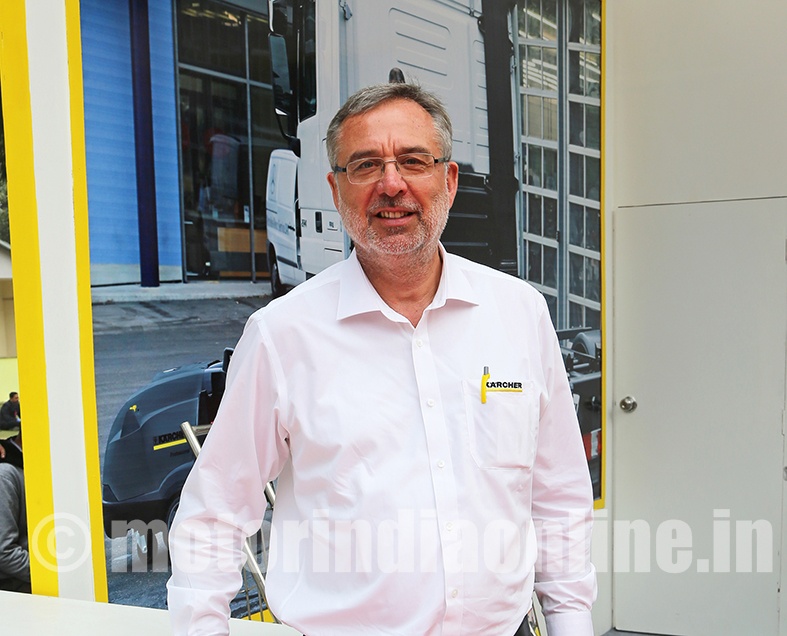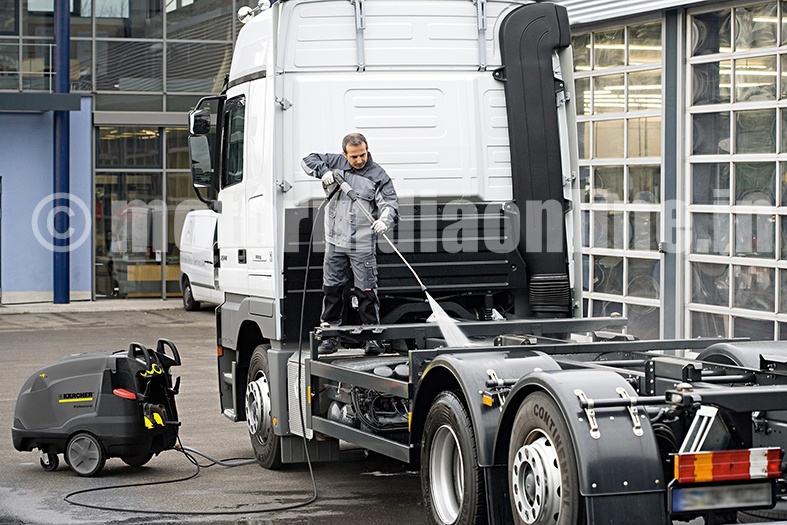Kärcher Cleaning Systems Pvt. Ltd., the 100 per cent subsidiary of Alfred Kärcher GmbH & Co. KG, is bent on outperforming the domestic mechanized cleaning solutions industry, which is worth Euro 100 million, and is poised to grow at a CAGR of 25-30 per cent until 2021. The Indian arm of Winnenden, Stuttgart-based firm, which commands a 15-20 per cent marketshare in the industry, is firming up plans to roll out more products, beef up its branch operations and also double its distribution network to 20 outlets in the medium term. The world’s biggest manufacturer of cleaning equipment is also very confident that its Indian operations will figure among its top 10 markets globally by 2025.
 Expressing his expert views, Mr. Ruediger Schroeder, Managing Director, Kärcher India, observed: “The (Indian) cleaning industry will
Expressing his expert views, Mr. Ruediger Schroeder, Managing Director, Kärcher India, observed: “The (Indian) cleaning industry will
definitely grow in a big way. A company like Kärcher, which has been in the market for over two decades and where the brand is already well recognized and has a robust distribution network through its own branch offices as well as dealers, can positively grow faster than most of our competitors. That is our goal and to further it we would come out with new products, ideas, cleaning solutions, etc. This is because we are a very innovative and resourceful company and would want to be a leader of the industry in the very near future.”
Shedding some further light on the vision for Kärcher, he said: “We, as a company, have a vision called Kärcher 2020, which is a 10-year plan that was implemented six years back. For India, it means we want to register a robust double-digit growth every year until 2020. We will also extend our branch network and expand into Tier-II cities. We want to service our customers all over India and are also looking for ‘Smart Solutions”.
Talking about its CV-centric products, Mr. Schroeder added: “In the truck space, we are offering cold water and hot water hi-pressure  cleaners to clean the engine compartment, components and also the exterior of the vehicle. Even though cleaning of the interiors is not so much on the agenda, we are offering machines like upholstery cleaning and extraction machines for cleaning the seats. We have gained good momentum from truck workshops. Many OEMs have recommended our products at their workshops because they have figured that our solutions are very much suitable for doing the right job.”
cleaners to clean the engine compartment, components and also the exterior of the vehicle. Even though cleaning of the interiors is not so much on the agenda, we are offering machines like upholstery cleaning and extraction machines for cleaning the seats. We have gained good momentum from truck workshops. Many OEMs have recommended our products at their workshops because they have figured that our solutions are very much suitable for doing the right job.”
However, he maintained that for buses it is still a work in process because the concerned decision makers are very slow in embracing their solutions. “People still think cleaning is cheap. But if you want economical solutions, you need pay a certain amount of money and get a good return. We are still working on convincing these customers (in the bus segment) that the long-term benefits accruing from our products would be much higher.”
While Karcher India is targeting workshops across all segments like two and four-wheelers, it is also working out strategies to tap big fleet operators comprising buses and trucks.
As Mr. Schroder pointed out, “There is yet not a major breakthrough on this front but we are actively working on that. At present, cheap labourers are used for cleaning them. Moreover, there is an infrastructural deficit because of (inadequate) power and water supply. On top of that, we have no place to install these machines, but we will see a lot of changes in the upcoming years.”
Mr. Schroeder concluded saying: “In Europe, we are already offering a solution called ‘Kärcher Connect’ wherein you can connect your cleaning machines to a central office for evaluating their working conditions. You can gauge running times of the machine, who is working on it or whether any wear-off parts have to be replaced and so on and so forth. These systems are readily available but people (in India) are not willing to use that. But we are very hopeful that over the next few years we will be able to sell such futuristic cleaning solutions in the country.”